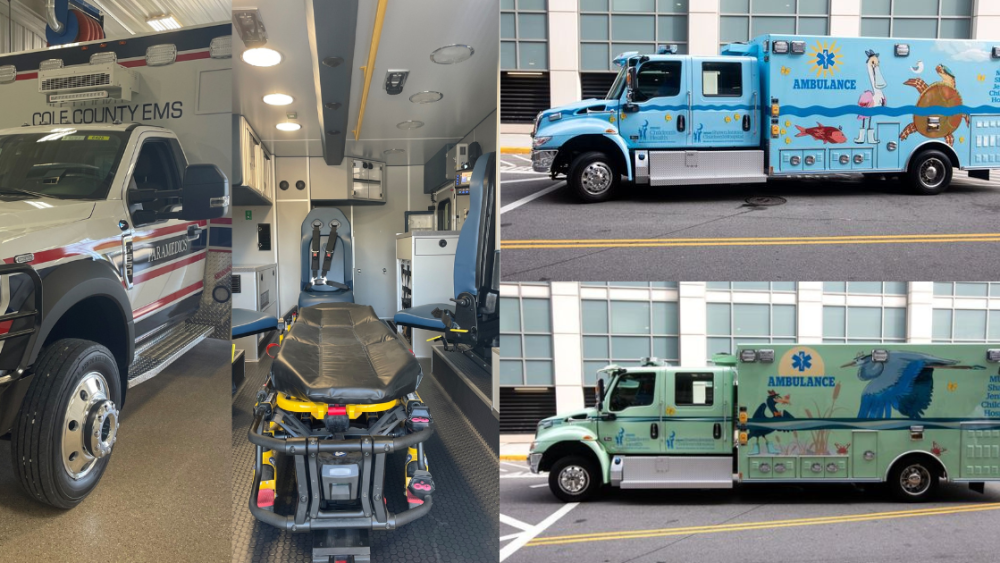Ambulance orders that used to take months have been taking years. Knowing that, you may be trying to make your ambulances last. But every rig will someday reach the end of its road, and you may want to consider the best new features before you shop around.
But first, some good news: Automotive shipment delays may be less of a hassle this year.
Experts such as Sam Fiorani, vice president of global vehicle forecasting at AutoForecast Solutions, say that the microchip shortage that has dogged the market in recent years is easing though not over.
“Better access to chips, and other components, will help manufacturers increase output of vehicles,” Fiorani wrote in an email to Cars.com.
So here’s a look beyond basic ambulance requirements at seven noteworthy features EMS agencies have been ordering and receiving recently.
1. Decontamination
AeroClave’s products for EMS and fire departments are specifically designed for first responders’ vehicles and can be used to clean a vehicle’s interior as a crewmember stands outside of it. You don’t have to return to a station to disinfect the ambulance.
AeroClave systems can be added to a rig your agency owns or can come already installed in a new ambulance.
In addition, a CASPR UV air purification system can be added to disinfect the air and surfaces.
Wheeled Coach, a subsidiary of REV Ambulance Group Orlando, Inc. and ambulance manufacturer, installed both systems in an ambulance for the U.S. Army. If you went to FDIC, you might have seen the rig on display.
2. Safety restraints
Horton, which also is part of REV Group, offers a four-point retractable harness that includes its own airbag.
The MBrace safety restraint can deploy within a fraction of a second and moves with the occupant in frontal impact collisions and rollovers, according to Horton’s website. MBrace significantly increases neck and head protection by securing and limiting spinal and head movement.
All Horton orders accepted after April 1, include MBrace as a standard feature for side-facing positions. Those include the CPR seat and the squad bench. MBrace is only available on Horton ambulances or as a retrofit option for most existing and remount Horton models.
3. Seats on tracks
Cole County EMS (of Jefferson City, Missouri) took delivery of an Osage Industries Super Warrior Type I Ambulance in November. The ambulance’s seats for providers are on tracks that allow crewmembers to move between the front and the back of the rig while keeping their safety belts on.
“With these seats, there should never be a reason for the crew not to be restrained,” Chief Eric Hoy told the News Tribune last year.
4. Dedicated air conditioning units
Cole County’s ambulance has dedicated A/C units in both the front and patient care compartments. Cole County EMS also chose a white exterior, as the primary exterior color helps reduce heat inside the ambulance.
5. A semi-truck chassis
MUSC Children’s Hospital in Charleston, South Carolina, took delivery of two new neonatal/pediatric Critical Care “Specialty Care” ambulances last year. When the city floods, the extra height makes it so these ambulances can keep responding to calls when others can’t.
6. Blue interior lights
Lanesborough Fire Department EMS providers received their new rig in November as a replacement for a 12-year-old ambulance. A power lift is a clear improvement, as is the addition of blue interior lights. Jen Weber, the EMS director for Lanesborough, said Dalton’s ambulance service inspired this choice.
The lights are a gentler option for those who don’t like bright lights, those with migraines or for those long 2 a.m. rides when the patient wants to sleep, Weber told “The Berkshire Eagle.”
The lights help providers to see what they’re doing without the full lights on.
7. An in-cab monitor
This feature can help EMS providers as they interact with patients’ loved ones. The Advocate Children’s Hospital in Chicago took possession of a custom-built ambulance last year. The rig is designed with pediatric patients in mind. And that monitor in the cab? That’s for parents who want to see what’s happening in the back.
Additional resources for an ambulance purchase
Learn more about ambulance features and purchases with these resources:
- How to buy ambulances (eBook)
- How to buy fleet management products (eBook)
- Keep your ambulances TOP SHELF and ready to roll













